Stefan Small. Montenegrin adventures of Peter III
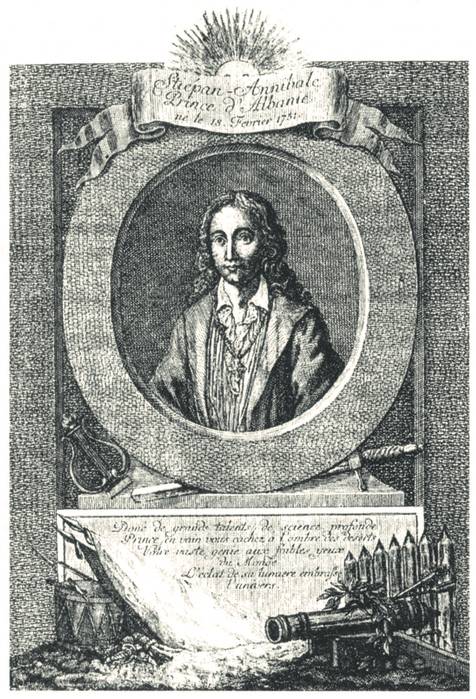
The most famous and successful of the impostors was Emelyan Pugachev, who, as you know, was defeated and executed in Moscow on 10 on January 1775. But a year later another Peter III appeared, who nevertheless managed to ascend the throne - true , not in Russia, but in Montenegro. Many then believed that this mysterious man, who came from no where from where, was really very similar to the deceased Russian emperor. And what do you think? Look at the portraits below:
Montenegro and the Ottoman Empire
The Ottomans inflicted the first blow on Montenegro back in 1439, and in 1499 it became a province of the Ottoman Empire, as part of the Skadar Sanjak. The Adriatic coast with Kotor Bay took control of the Venetians.
But in the mountains, the Ottomans' power was always weak, sometimes almost nominal. In the XVII century, in response to attempts by the Turks to introduce Haraj (a tax on the use of land by Gentiles) in Montenegro, a series of uprisings followed. Realizing that the forces are unequal, in 1648, the Montenegrins made an unsuccessful attempt to go under the protectorate of Venice. In 1691, at the request of the Montenegrins, the Venetians sent a military detachment to them, which, due to its small size, could not provide real help. As a result, in 1692, the Ottomans even managed to capture and destroy the Tsetinsky monastery, which seemed impregnable, whose metropolitan enjoyed great authority and was then the only person who at least somehow united the Montenegrins constantly warring among themselves.
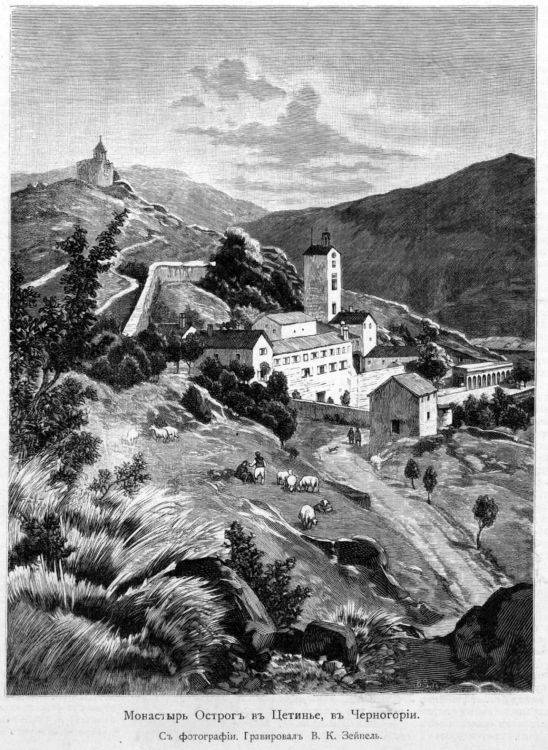
Montenegro in the 18th century
It should be said that the territory of Montenegro in the XVIII century was much less modern, on the map presented it is highlighted in yellow.
At this time, with the growth of power and influence of the Russian Empire, the Montenegrins began to associate their hopes for liberation from Ottoman oppression with our country. Moreover, Peter I in 1711 issued an appeal to the Christian peoples of the Ottoman Empire, in which they called for an uprising and the provision of military assistance to a faithful Russia. In Montenegro, this appeal was heard, in the same year a guerrilla war against the Ottomans began here, in 1712 the Montenegrins even managed to defeat a large enemy detachment near Tsarev Laz. In response, during the punitive expedition of 1714 of the year, the Turks ravaged and burned a large number of Montenegrin villages.
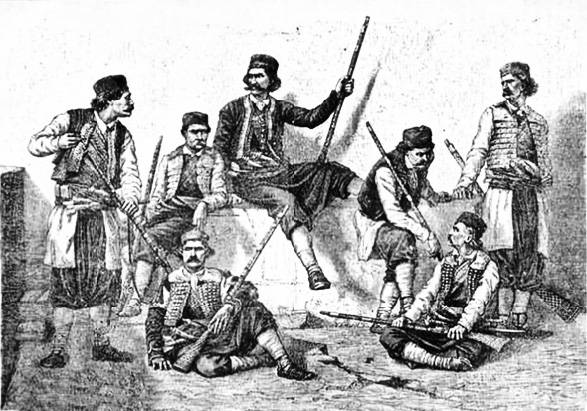
In 1715, Metropolitan Danila traveled to Russia, receiving church books, utensils and money to help the victims of the Turks as a gift. Russian subsidies for the Cetinje Monastery became permanent, but the governor (managing secular affairs) and tribal elders received a “salary” from Venice.
Thus, the Orthodox Church of Montenegro and the common people have traditionally advocated an alliance with Russia, and secular authorities and rich people, as a rule, have focused on Venice.
By the way, when the Montenegrins did not receive Russian money in 1777, Governor Jovan Radonic entered into negotiations on “subsidies” with Austria. In collaboration with the Austrians, Metropolitan Peter I Nyegos was suspected then, who was expelled from St. Petersburg for such double-dealing in 1785.
It seems to me that these facts explain a lot in the behavior of the modern rulers of Montenegro, seeking to join the European Union and have already achieved the country's accession to NATO.
The appearance of the hero
But back in the 18th century and see in 1766, on the territory of the so-called Venetian Albania (Venice controlled by the Adriatic coast of Montenegro), a strange man of about 35-38, who himself called himself Stefan Maly.
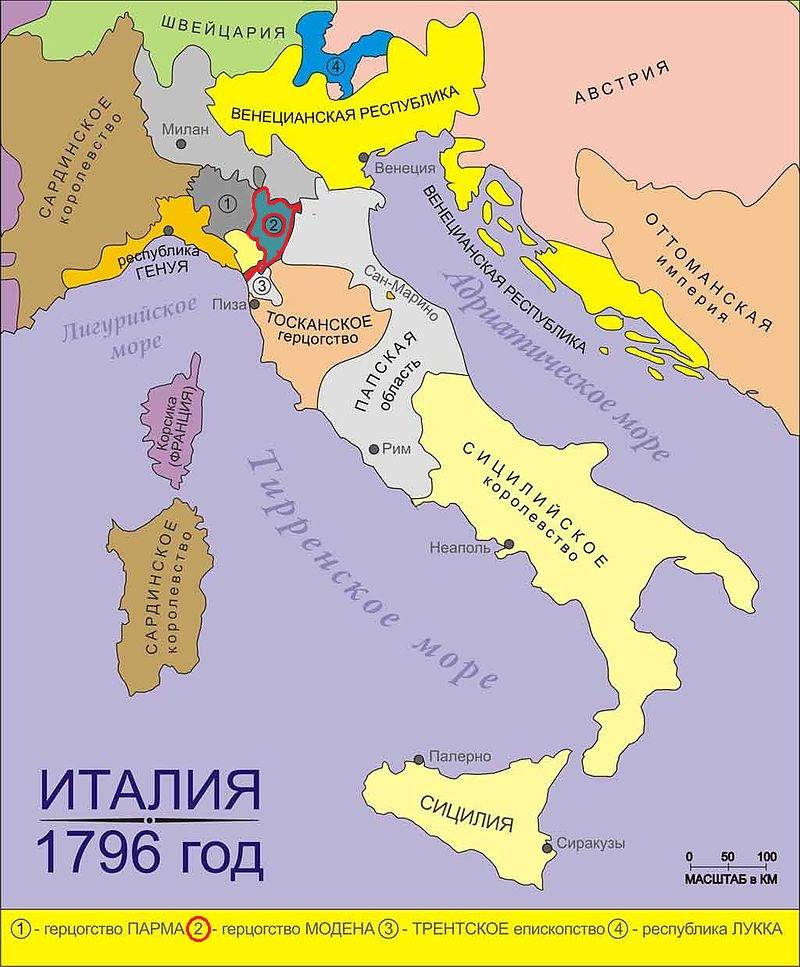
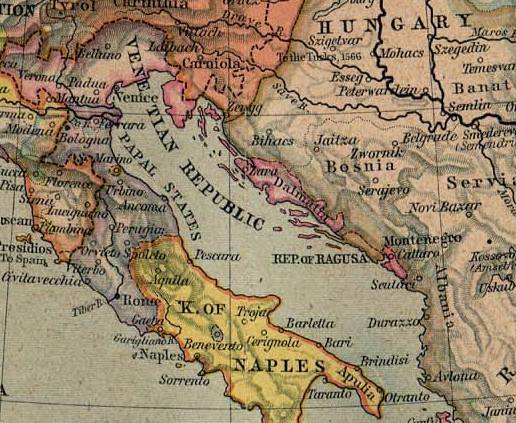
Later, a version appeared that Stefan received his nickname because he was "with good kind, with simple - simple" (or, in another version - "with small is small"). However, there is another explanation. It is known that a strange newcomer treated people not without success, and in Verona in the middle of the 18th century a very famous and popular doctor Stefan Piccolo (Small) worked. Perhaps it was in his honor that our hero took his name. He himself admitted to the Russian general Dolgorukov that he often had to change names.
As for the origin, sometimes Stefan called himself a Dalmatian, sometimes a Montenegrin or Greek from Ioannina, and sometimes said that he came from Herzegovina, Bosnia or Austria. He told the Serbian Patriarch Vasily Brkich that he had come from Trebinje, "lying in the east."
Stephen’s level of education has reached us with the most contradictory information. So, his implacable opponent, Metropolitan Savva, said that Stephen was illiterate, but this, nevertheless, seems unlikely. But the monk Sofroniy Plevkovich claimed that Stefan was a real polyglot - in addition to Serbo-Croatian, he knew Italian, French, English, German, Russian, Greek, Turkish, Arabic. Some contemporaries note that Stefan in appearance and manner of holding gave the impression of a clergyman. Others say that he knew peasant labor well and possessed all the skills necessary for agricultural work. He usually dressed in the Turkish manner ("in Albanian"), from which some concluded that Stefan grew up in the Muslim environment and converted to Orthodoxy at a conscious age, breaking with his relatives, which allegedly served as the reason for his expulsion and long wanderings . But he treated the “German clothes” without prejudice: when he considered it necessary, he changed clothes and it was clear that he felt quite confident and comfortable in her, she did not seem unusual for him. In general, despite the abundance of evidence, the identity of this person remains a mystery to historians. After the death of Stephen, Metropolitan Savva said:
Emperor
In the village of Maina, Stefan hired a laborer to Vuk Markovich (in other sources, on the contrary, to Marko Vukovich). In addition to the usual agricultural work, Stefan began to treat the surrounding residents, at the same time conducting conversations with patients and their relatives about the need to unite all Montenegrins and stop the feud between the communities (after all, they usually listen to a doctor more carefully than a shepherd or gardener). Gradually, his fame went beyond the village, and soon rumors began to circulate throughout the district that the stranger was not a simple person, apparently he was hiding from enemies, taking on someone else's name. Then Stefan acts according to the traditional “scheme” of many impostors - “reveals himself” to his master: he says in great secret that he is the Russian Tsar Pyotr Fedorovich, who managed to escape from enemies abroad. Extremely proud that the All-Russian Emperor himself appeared in his laborers, Markovich, of course, could not resist: he told some others, those others, and soon there was not a single person in the whole district who would not know about "The secret of Stephen Small." By the way, he himself never publicly called Peter III himself, but he didn’t particularly mind when others called him that.
Then everything went like clockwork: cattle trader Marko Tanovich, who served in the Russian army in 1753-1759, and, as he assured, was introduced to Grand Duke Pyotr Fedorovich, confidently recognized the Russian emperor in Stefan. Other witnesses were found - some monks Theodosius Mrkoevich and Jovan Vukichevich, who visited Russia at about the same time. And then in one of the monasteries they found a portrait of Peter III, and decided that the resemblance to the farm laborer Markovich was simply obvious.
The following descriptions of Stefan's appearance are preserved:
“Shiny eyes with arched eyebrows. Long, turkish brown hair. ”
"Of medium height, thin, white complexion, does not wear a beard, but only a small antennae ... On the face are traces of smallpox."
"His face is white and long, his eyes are small, gray, sunken, his nose is long and thin ... His voice is thin, like a woman's."
By that time, it turned out that a few months ago (in February 1767), Stefan had sent a letter to a Venetian general manager, A. Renier, through a soldier asking him to prepare for the arrival of the Russian “light emperor” in Kotor. Then he did not pay attention to this strange letter, but now the rumors of an impostor could no longer be ignored. And so Renier sent Colonel of the Venetian service Mark Anthony Bubich to Stefan, who, having met with him (October 11), said:
Now the appearance in Montenegro of the “Russian emperor” has become almost inevitable. And he appeared: at first Stefan the Small was recognized as the “Russian Tsar Peter III” at a meeting of Montenegrin foremen in the mountain village of Tseglichi, then at the end of October in Zetinje the assembly of 7 thousands recognized him also as the “Russian sovereign of Montenegro”, about which he was extradited to the new monarch the corresponding letter is November 2 of 1767 of the year.
The first to "recognize" the "emperor", Marco Tanovich was appointed Grand Chancellor. To protect the "king" a special detachment was created, which initially consisted of 15 people, and only in the future its number increased to 80.
In November, Stefan traveled around the country, meeting with an enthusiastic reception and surprising the people with sanity and justice.
The news of the "reign" of Stephen Maly caused widespread enthusiasm not only among the Montenegrins, but also among the Albanians and Greeks, who, as they wrote, "came to him in large numbers to express allegiance to Russia and the Russian people."
Metropolitan Savva, who traditionally was in Montenegro, if not a ruler, then a figure very close to him, the "king", of course, really did not like. He even tried to “expose” Stephen as an impostor, but forces were not on his side, and therefore the Metropolitan, in the end, was forced to appear before Peter III. The “Tsar” accused the hierarch of indulging the vices of the Montenegrin clergy before the people, and the frightened metropolitan (who was even forced to kneel down) publicly recognized Stephen Maly as the Russian emperor Peter III and the sovereign of Montenegro.
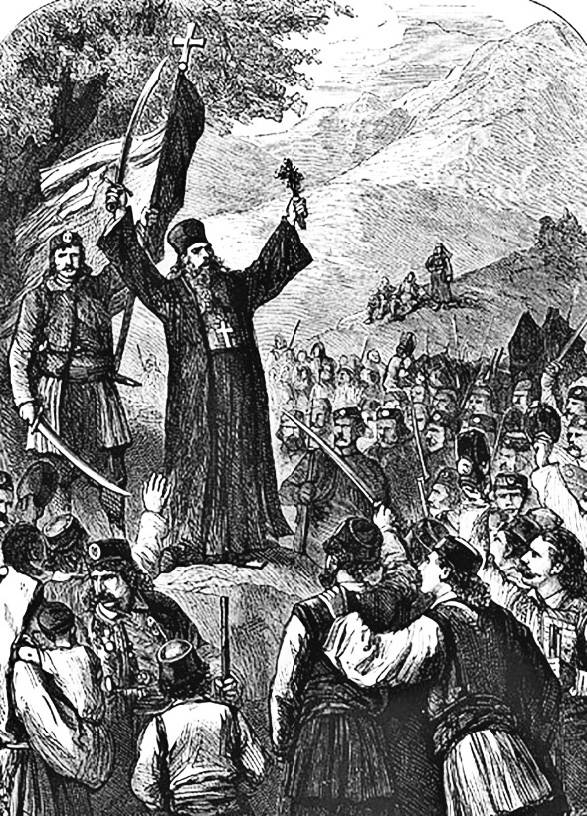
Verbally acknowledging Stefan, the metropolitan immediately sent a letter to the Russian envoy in Constantinople A.M. Obreskov, in which he informed of the appearance of the impostor and asked about the "real" emperor.
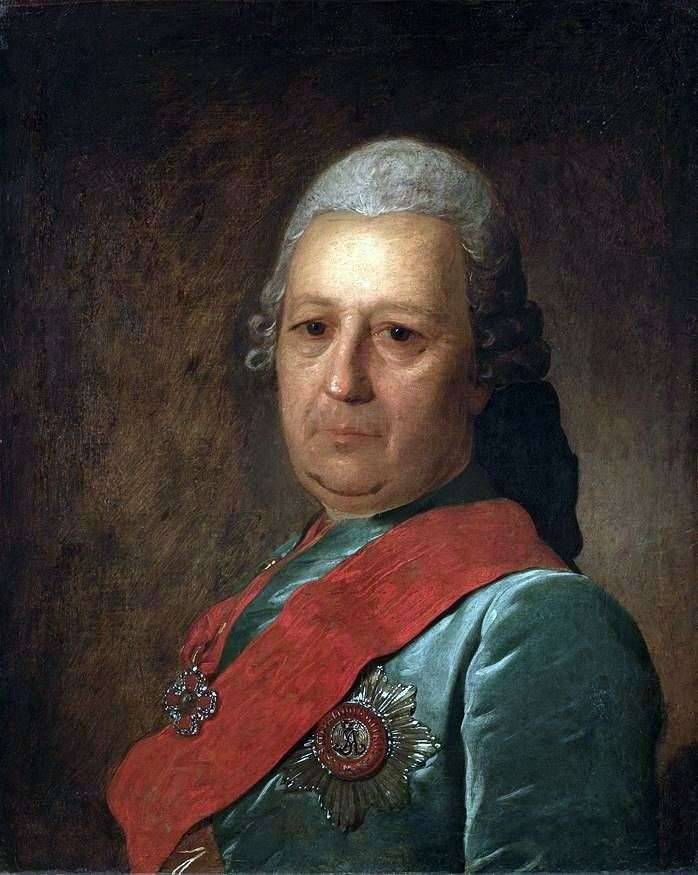
Obreskov in his response letter confirmed the death of Peter III and expressed "surprise at pranks." Himself, in turn, sent a report to St. Petersburg. After receiving correspondence from the capital, he already sent an official letter to Savva (dated 2 on April 1768), in which he was accused of “frivolity”, and Stephen Maly was called “a rogue or an enemy”.
Now the metropolitan could go on the offensive: he informed the Montenegrin elders about Obreskov’s letter, and called Stephen to one of the monasteries for an explanation. But Stefan, in turn, accused him of “selling himself to Venice”, speculating in the land, stealing church valuables and money sent from Russia. And then he made the participants of the meeting “an offer that cannot be refused”: to seize the property “stolen” by them from the Metropolitan and “fairly” divide it among the patriots gathered here. As you probably guessed, there were no objections from anyone. Savva still remained a metropolitan, but Stefan now relied more on the Serbian patriarch Vasily Brkic, who came to him, being expelled from the Pecs by the Ottomans after the liquidation of the independent Serbian Orthodox Church. In March 1768, Vasily called on all Orthodox Christians to recognize Stephen the Russian Tsar (it turns out that the Russians too).
"Russian Tsar of Montenegro"
After this, Stefan finally got the opportunity to do reforms, his innovations were surprisingly reasonable. He forbade blood feud by setting punishments for criminal offenses (murder, theft, cattle dropping, etc.), and carefully monitored the execution of the sentences. The church was separated from the state. The first Montenegrin school was opened, where children were taught, including the Russian language. The construction of roads and fortifications began. One of the Montenegrin elders wrote then:
Even Stephen’s foe, Metropolitan Savva, admitted:
The Turks and Venetians jealously followed Stefan's successes, suspecting each other of the secret support of the "king". Europe did not know what to think, assuming the intrigue of England, France, Austria in the Montenegrin events and even seeing a Russian trace in them: either Catherine II was trying to strengthen her influence in the Balkans in such an extravagant way, or her opponents were creating a springboard and a base for a new coup d'etat. Catherine, of course, was very afraid of the latter option. And therefore, in the spring of 1768, the adviser to the Russian embassy in Vienna, G. Merk, was instructed to go to Montenegro to clarify the situation and expose the impostor. However, Merck got only to Kotor, into the mountains, he did not dare to rise, declaring that "the Montenegrins are faithful to their king, and therefore it is dangerous to go to them."
In 1768, Turkish troops moved to Montenegro. Volunteers from Bosnia and Albania came to the aid of the Montenegrins, among the Albanians, there was also a very authoritative “field commander” Simo Suts, whose Ottomans then told terrible tales to their children.
And the Venetians tried to solve the problem with the help of poison, having promised the poisoner a refuge, forgiveness of all crimes and 200 ducats in cash. But they could not find a skillful and desperate (given the reputation of the Montenegrins) performer. And then in April of 1768, Venice sent against Stephen the 4-thousandth detachment, which cut Montenegro from the sea. The richest of the Montenegrins, whose trading interests were closely connected with the Venetian Republic, were no longer happy about the appearance of the king, but the people supported Stephen. In July 1768, the Montenegrin ambassadors tried to negotiate with Renier. In response, he demanded to expel Stephen Maly from the country, but the Montenegrins said that they
Stefan focused on the fight against the Ottomans, Tanovich - acted against the Venetians.
On 5 of September 1768, in a decisive battle near the village of Ostrog, the army of Stephen the Small was surrounded and defeated, he himself could hardly escape, and was forced to hide for several months in one of the mountain monasteries. Against this background, the rebellious Savva, who achieved the election of the second metropolitan - Arseny, again opposed him, supported by the Venetians. It was assumed that he would support with his authority the not-so-popular Savva. But then the opponents of Stephen miscalculated, because Arseny was a friend of Marco Tanovich.
The Turks could not develop their success because of heavy rains that washed away the roads. And on October 6, the Ottoman Empire declared war on Russia, and the Sultan was not up to the small and poor Montenegro.
This Russo-Turkish war, which lasted from 1768 to 1774, forced Catherine II on 19 on January 1769 to issue a manifesto in which all Christian peoples of the Ottoman Empire were called upon to “use circumstances of this war that were useful to them, to take advantage of the overthrow of the yoke and to bring themselves independence, taking up arms against the common enemy of all Christianity. " The Montenegrin "Peter III" Catherine II, of course, could not recognize her murdered husband. But Montenegro was a natural ally of Russia, and also did not want to abandon it. Therefore, Major General Yu.V. Dolgorukov was sent to this country, to whom 9 officers and 17 soldiers were assigned.
A small detachment of Dolgorukov reached the Adriatic with a squadron of Alexei Orlov. Under the name of the merchant Baryshnikov, Dolgorukov rented a small vessel, on which his detachment reached the Bay of Kotor in Venetian Albania.
From there, the general headed for the mountains. On August 17, at the assembly in Cetinje, in the presence of two thousand Montenegrins, elders and church authorities, Dolgorukov declared Stephen an impostor and demanded that those present take the oath of allegiance to the ruling Russian empress - Catherine II. In support of his demands, the Serbian patriarch Vasily also spoke out, who declared his former benefactor “a troublemaker and a villain of the nation”. An oath to Catherine was brought. Stefan was not present at this meeting, he arrived only the next day and was immediately arrested. When asked why he appropriated the name of the late Russian emperor, he answered:
Dolgorukov was a bold and skillful military leader, but the diplomat was useless. Unaware of the local situation and Montenegrin customs, he acted bluntly and even rudely, and quickly quarreled with the elders who at first enthusiastically accepted him. His main adviser in Montenegrin affairs suddenly became the "king" arrested by him. Communicating with him, Dolgorukov unexpectedly came to the conclusion that Stefan has neither intentions nor the ability to challenge the power of Catherine II, and his rule in Montenegro is in the interests of Russia. Therefore, he liberated Stefan, presented him with a Russian officer uniform, left with him 100 barrels of gunpowder, 100 pounds of lead, and departed to the squadron of Alexei Orlov - 24 on October 1769. 50 Montenegrins joined his detachment, who decided to enlist in the Russian army .
Thus, Stephen Small was actually officially recognized as the ruler of the country. As such, he established contacts with the commander of the Russian land army Peter Rumyantsev and “his killer” - Alexei Orlov, who led the Russian squadron of the Mediterranean Sea.
And General Dolgorukov in the Orlov squadron received a very unexpected appointment: he never served in navy, he went to the three-day battleship “Rostislav” (crew of 600 people, 66 large guns, the total number of guns - up to 100, captain - E.I. Lupandin, arrived in the archipelago with Greig's squadron). On this ship, Dolgorukov had a chance to participate in the Chesme battle.
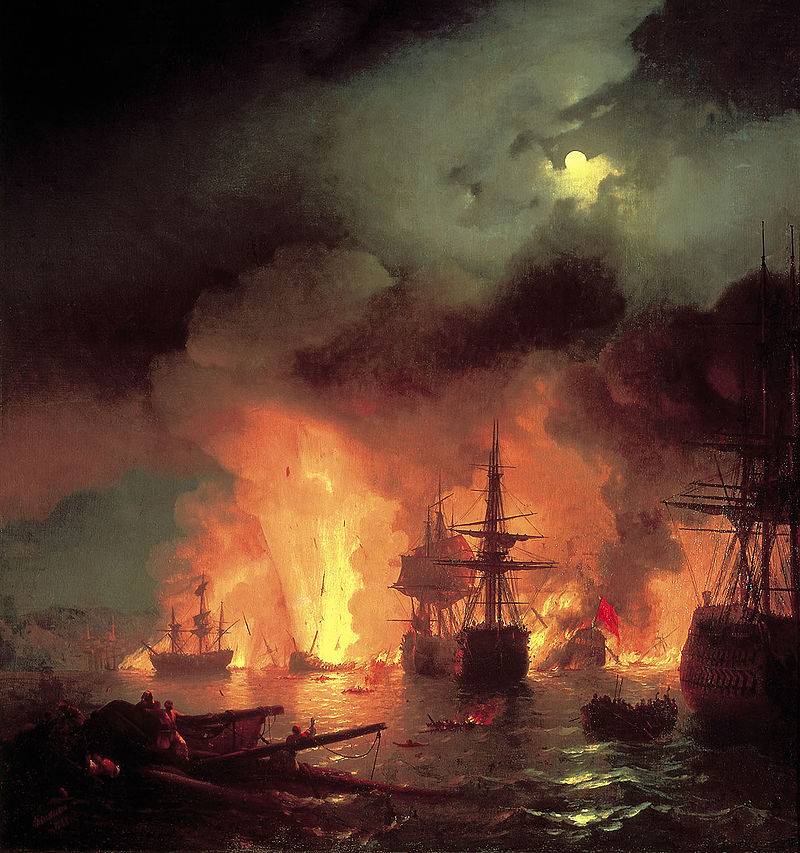
It is difficult to say what future Montenegro would have expected under a longer reign of Stephen the Small. But fate turned out to be unfavorable to this talented and outstanding person, he almost no longer had time. A year later, in the fall of 1770, when examining the construction of a new mountain road, a charge of gunpowder exploded next to it. Stefan was seriously injured, resulting in blindness. Being now inseparably in the monastery Dolny (Lower) Brcheli, he still continued to lead the country through his loyal Tanovich and Metropolitan Arseny.
In 1772, an “inspection” military detachment was even created to monitor the execution of its orders. This compound was headed by S. Baryaktarovich, who had previously served in the Russian army.
The death of Stephen Small
But the power of Stephen over Montenegro did not suit the Turks. Skadar Pasha managed to introduce into his entourage a traitor - the Greek Stanko Klasunu, who stabbed the unfortunate man with a knife. It happened in August (according to other sources - in October) of the 1773 of the year. The head of Stephen, which the traitor brought to Skadar (Shkodra), was later transported as a gift to the Sultan in Constantinople.
Stefan's body was buried in the church of St. Nicholas in the Dolni Brceli monastery.
For a long time, Marco Tanovich tried to convince the people that “Tsar Peter” had not died, but had gone to Russia for help, and would soon return. But the Russian king of Montenegro was already only part of the common stories our countries.
A parody of an impostor
Stefan Maly was so famous in Europe at that time that an adventurer of international scale Stefan Zanovich, an Albanian born in 1752, tried to use his name in 1760. In XNUMX, his family moved to Venice and became very wealthy in the shoe trade. This education Stephen, like his brother Primislav, received at the University of Padua. Giacomo Casanova, in his Memoirs, called the brothers “two great scammers,” which in his mouth can probably be considered a compliment. Here is the characteristic that Casanova gave to Primislav:
Do not you think that jealousy for the young, but already very “toothy predator” and competitor is heard in these words of Casanova?
The Zanovichi brothers were worth each other, so they had to flee from Venice at the same time. Instead, their portraits were hung on St. Mark's Square - not in picture frames, but on the gallows. But Stefan, by all accounts, nevertheless surpassed his brother and was a cheater of a higher level. He was fluent in cold weapons, was familiar with Voltaire, d'Alembert and Carol Radziwill (Panet Kohanku). It is very likely that he met with "Princess Tarakanova."
Stefan Zanovich traveled extensively throughout Europe, visiting various cities of Italy and Germany, England, Holland, France, Prussia, Poland. During these wanderings, he called himself Bellini, Balbidson, Wart, Charnovich, Tsarablados and Count of Castriot-Albanian. For obvious reasons, this adventurer did not stay long anywhere. He even managed to make friends with the heir to the Prussian throne, Frederick William. But such a suspicious friend did not like the prince's father Frederick the Great. Therefore, the adventurer also had to leave Prussia in a hurry. In Amsterdam, presenting letters of recommendation to the Venetian ambassador in Naples, Stefan so sensitively “nibbled” local bankers that he almost provoked a Dutch war with the Venetian Republic. The Austrian Emperor Joseph II had to act as a peacemaker. In Montenegro, he came just from Amsterdam. Here he tried to pass himself off as the murdered Stephen Small, but the Montenegrins remembered their “king” well, and the Russian Emperor Peter III was not destined to “rise again”. This did not prevent the adventurer from presenting himself in Europe as the “Montenegrin Tsar Stephen Maly” and impersonating him. In 1784, he wrote the book "Stepan the Small, otherwise Etienne Ptit or Stefano Piccolo, Emperor of Russia, pseudo-Peter III", in which he attributed to himself the acts of the real king of the Montenegrins, adding to them fictional stories about "his anti-Turkish exploits." In this book, he placed his own portrait with the inscription:
To enhance the effect, under the image was still the pseudocyte of the Prophet Muhammad:
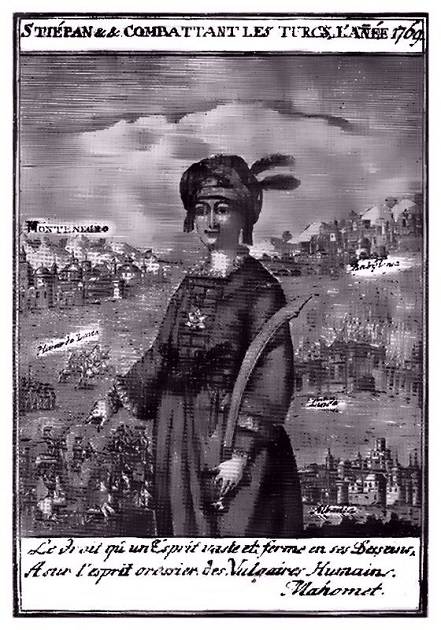
This portrait is still mistakenly considered by many to be the authentic image of Stephen Maly.
Then the adventurer, as the “Montenegrin king”, undertook to help the Dutch in their conflict with the Austrian Emperor Joseph II over shipping on the Scheldt River. Entangled in intrigue, he nevertheless ended up in an Amsterdam prison, where he committed suicide.
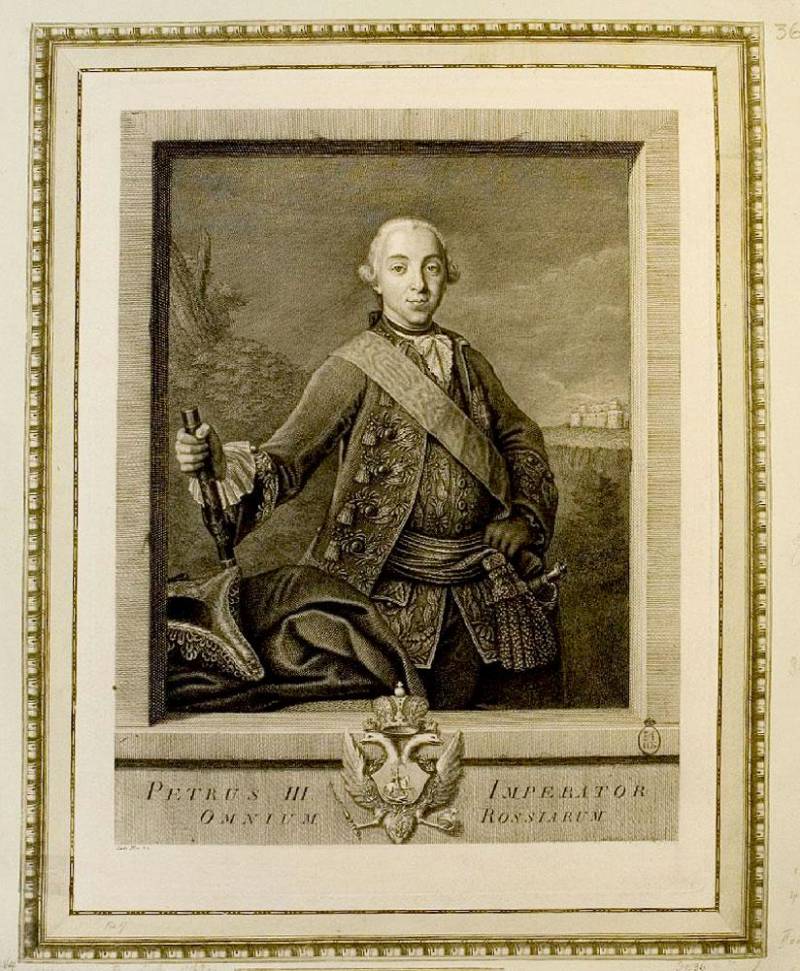
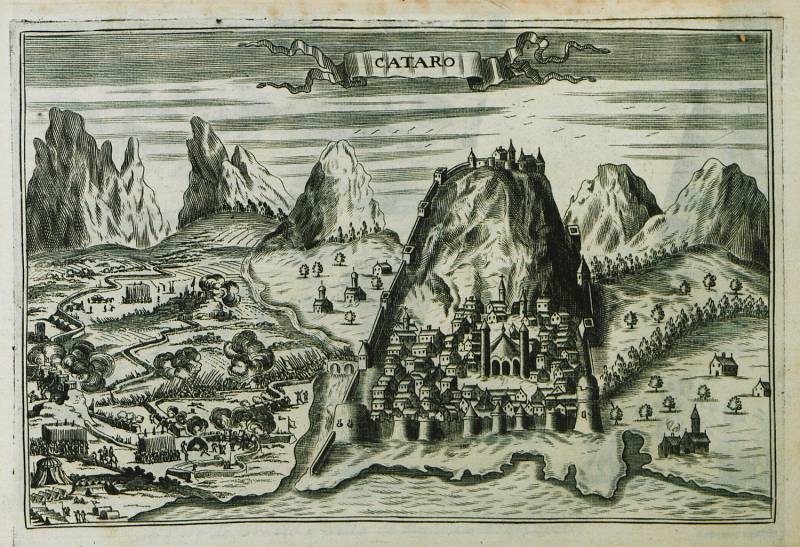
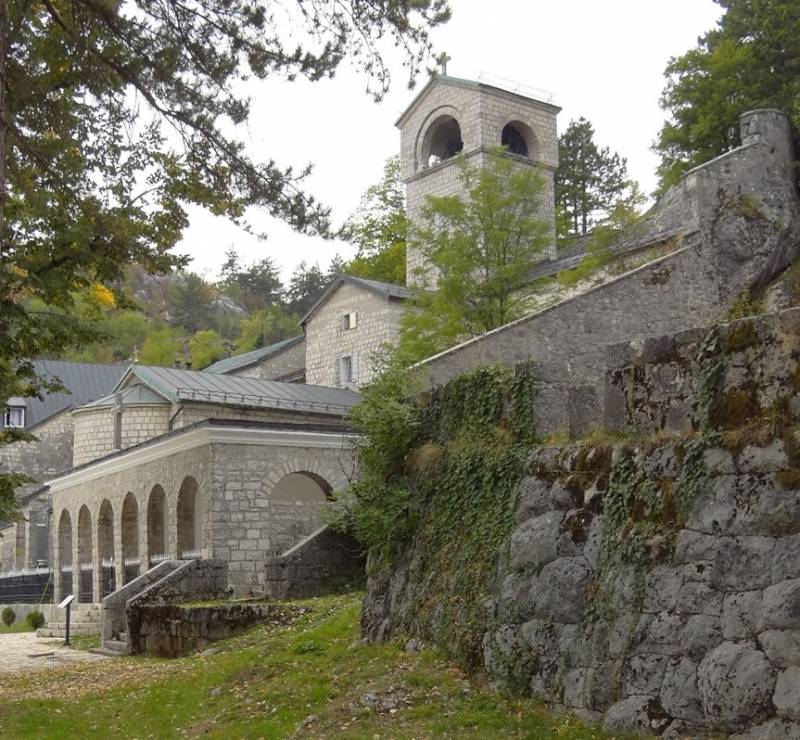
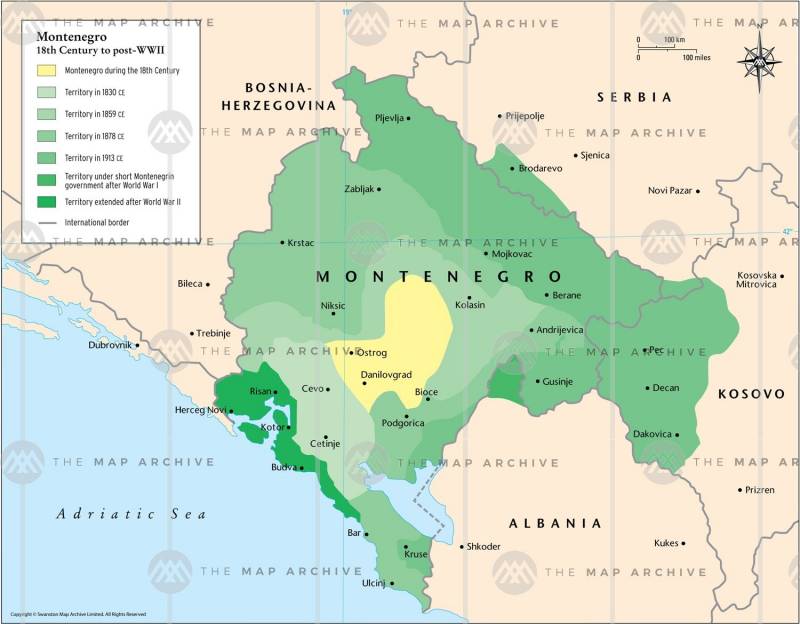
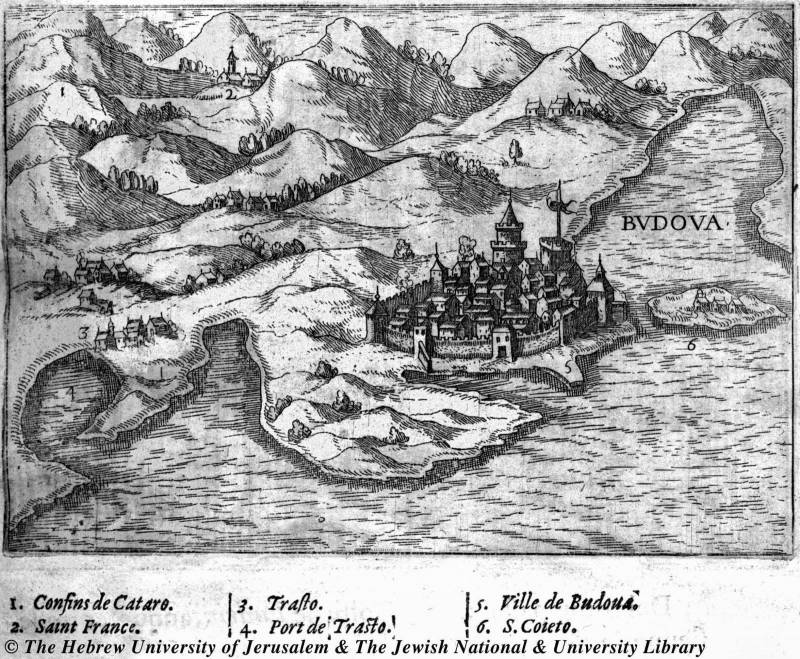
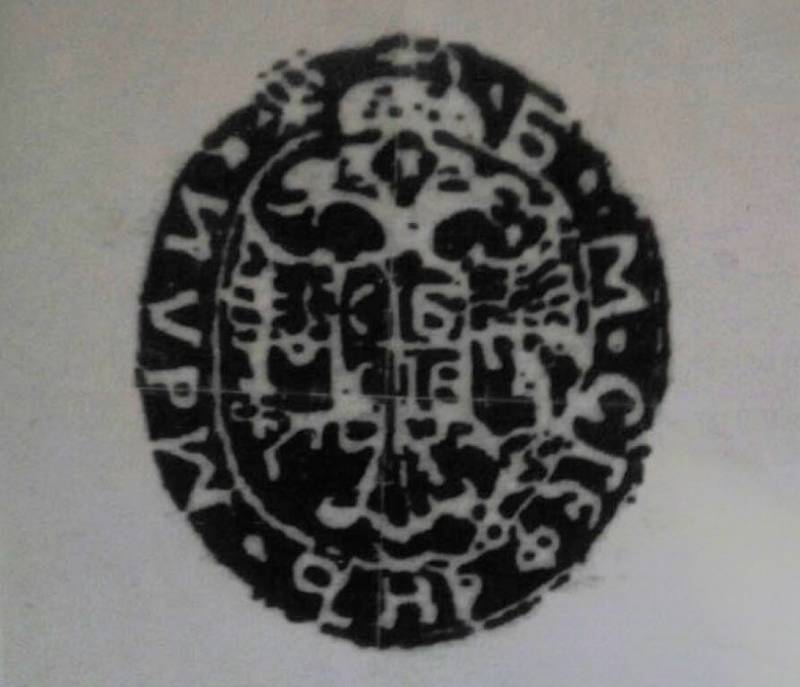
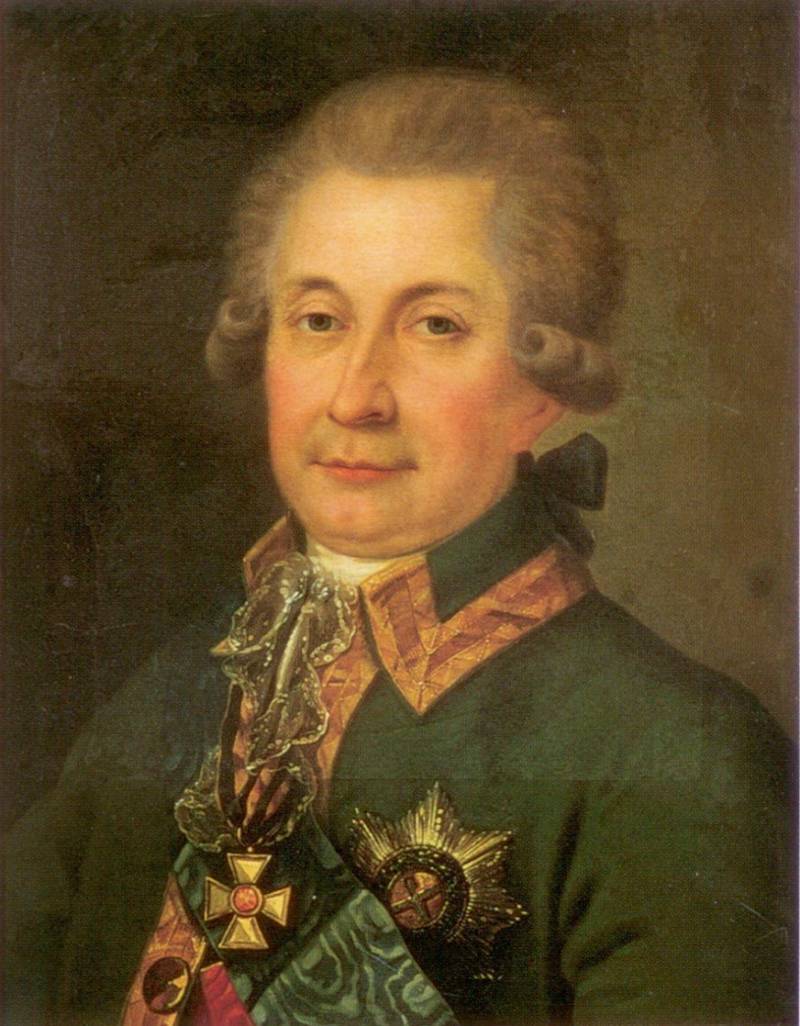
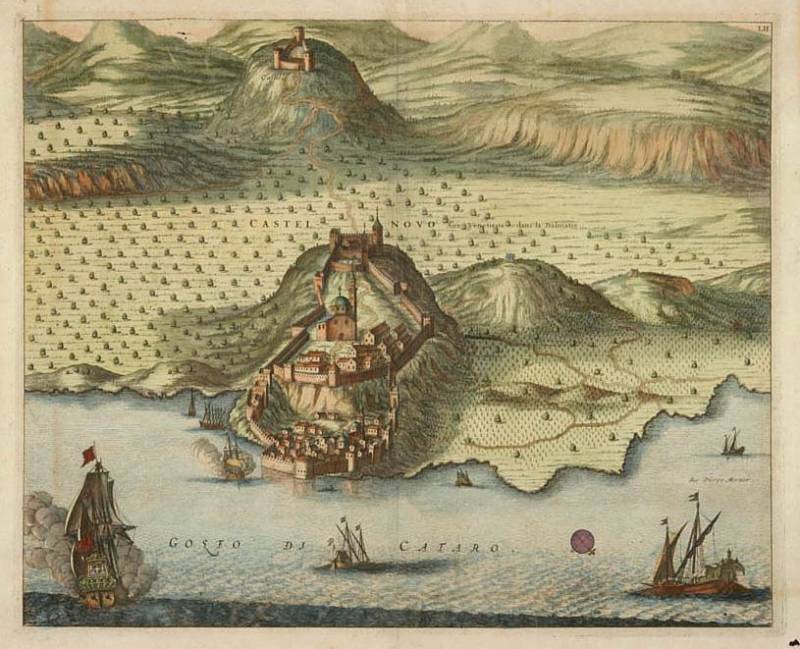
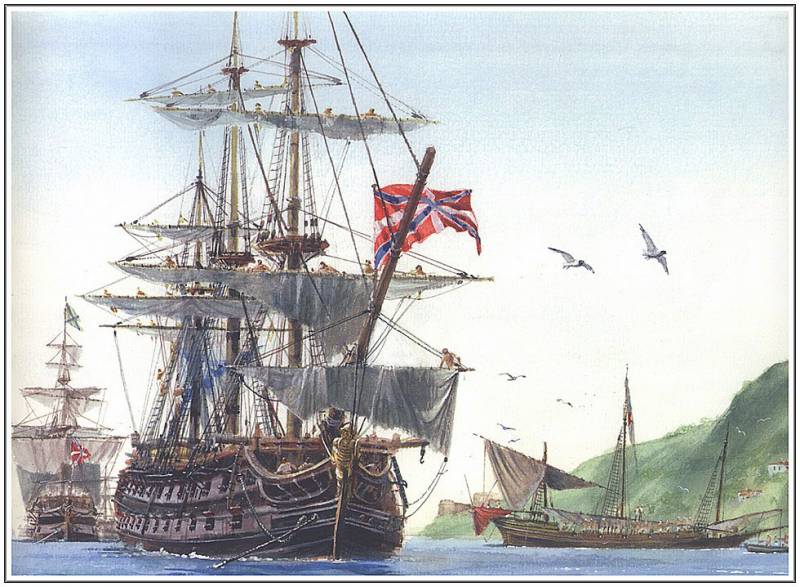
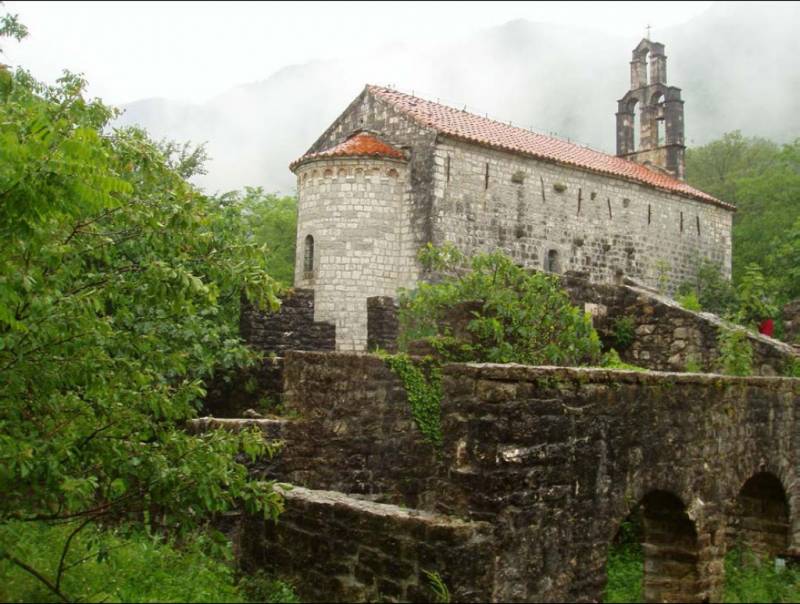
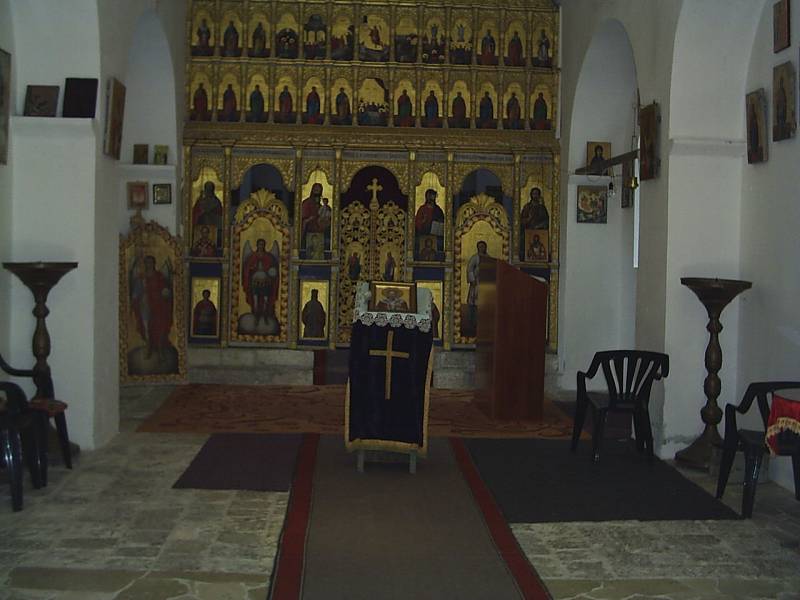
Information